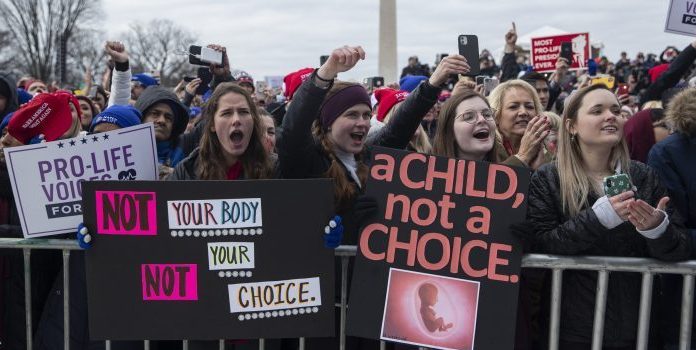(Headline USA) Anti-abortion leaders across America were elated a year ago when Donald Trump became the first sitting U.S. president to appear in person at their highest-profile annual event, the March for Life held every January.
The mood is more sober now — a mix of disappointment over Trump’s defeat and hope that his legacy of judicial appointments will lead to future court victories limiting abortion rights.
Organizers of this year’s March for Life in Washington, scheduled for next Friday, have asked their supporters to stay home, due to political tensions in the city and the coronavirus pandemic.
They plan instead to livestream the activities of a few invited participants, a sharp contrast to the tens of thousands of people who usually attend.
Meanwhile, Trump, whose administration took numerous steps to curtail abortion access, has been replaced by Democrat Joe Biden, a staunch supporter of killing unborn babies.
Biden’s fellow Democrats now control both chambers of Congress, thanks to victories in two Senate runoff elections in Georgia.
On Friday, the 48th anniversary of the Supreme Court’s Roe v. Wade decision establishing a nationwide right to abortion, Biden and Vice President Kamala Harris said they would seek to enshrine that right into federal law to protect it from court challenges.
“In the past four years, reproductive health, including the right to choose, has been under relentless and extreme attack.” their statement said. “We are deeply committed to making sure everyone has access to care – including reproductive health care.”
The president of the March for Life, Jeanne Mancini, said she and her allies worry the Biden administration will pursue “radical pro-abortion extremism.”
At the same time, activists opposed to mutilating and murdering babies are buoyed by Trump’s appointment of scores of federal judges – including three Supreme Court justices – who are viewed as open to repealing or weakening Roe v. Wade.
In Republican-governed states, scores of tough anti-abortion bills have been enacted in recent years, and more are surfacing this year from GOP lawmakers eager to see if any of these measures might reach the Supreme Court as a challenge to Roe v. Wade.
“I am very optimistic.” said Carol Tobias, president of the National Right to Life Committee. “We’ll see a lot of new pro-life bills… and we are going to see judges who are open to them.
In Arkansas, a new bill would criminalize abortions except to save a pregnant woman’s life.
The measure declares: “It is time for the United States Supreme Court to redress and correct the grave injustice and the crime against humanity which is being perpetuated by its decisions in Roe v. Wade” and other cases.
The Texas legislature also will consider several sweeping abortion bans.
In Montana, anti-abortion bills are expected to advance now that Republican Greg Gianforte has replaced Democrat Steve Bullock as governor. Bullock supported abortion rights during eight years in office.
South Carolina lawmakers are considering a bill that would ban abortions once a fetal heartbeat can be detected, usually around six weeks after conception.
Similar bills have passed in several other states, but courts have blocked their implementation.
Elizabeth Nash, who tracks state government issues for the Guttmacher Institute, which supports abortion rights, says anti-abortion legislation may get top priority in many states.
Referring to anti-abortion lawmakers, Nash said, “They see the Supreme Court as being in their corner, and it’s their job to continue to pass restrictions and bans.”
Among abortion-rights activists, there’s relief and optimism as the Biden administration takes power Biden is expected to soon issue executive orders reversing pro-life actions taken by Trump.
One such order would rescind the so-called “global gag rule” that prohibits the use of U.S. foreign assistance for abortion-related services.
Another order would rescind what abortion-rights supporters called the “domestic gag rule,” barring Title X family planning funds from going to any health care providers who perform abortions or make referrals for them. The ban prompted Planned Parenthood, the leading abortion provider in the U.S., to quit the program rather than comply.
Abortion-rights supporters also hope that Congress, under Democratic control, will repeal the Hyde Amendment, which bans federal funding for abortions unless a woman’s life is in danger or in cases of rape or incest.
Biden, a longtime supporter of the amendment, reversed himself in 2019 and now favors its repeal. But prospects for repeal are uncertain, given that Democrats would need some Republican votes in the Senate to overcome a potential filibuster.
However, the Democrats’ narrow Senate majority is expected to be sufficient to confirm Biden’s nomination of California Attorney General Xavier Becerra – a strong supporter of abortion rights — to head the Department of Health and Human Services.
Adapted from reporting by the Associated Press.

